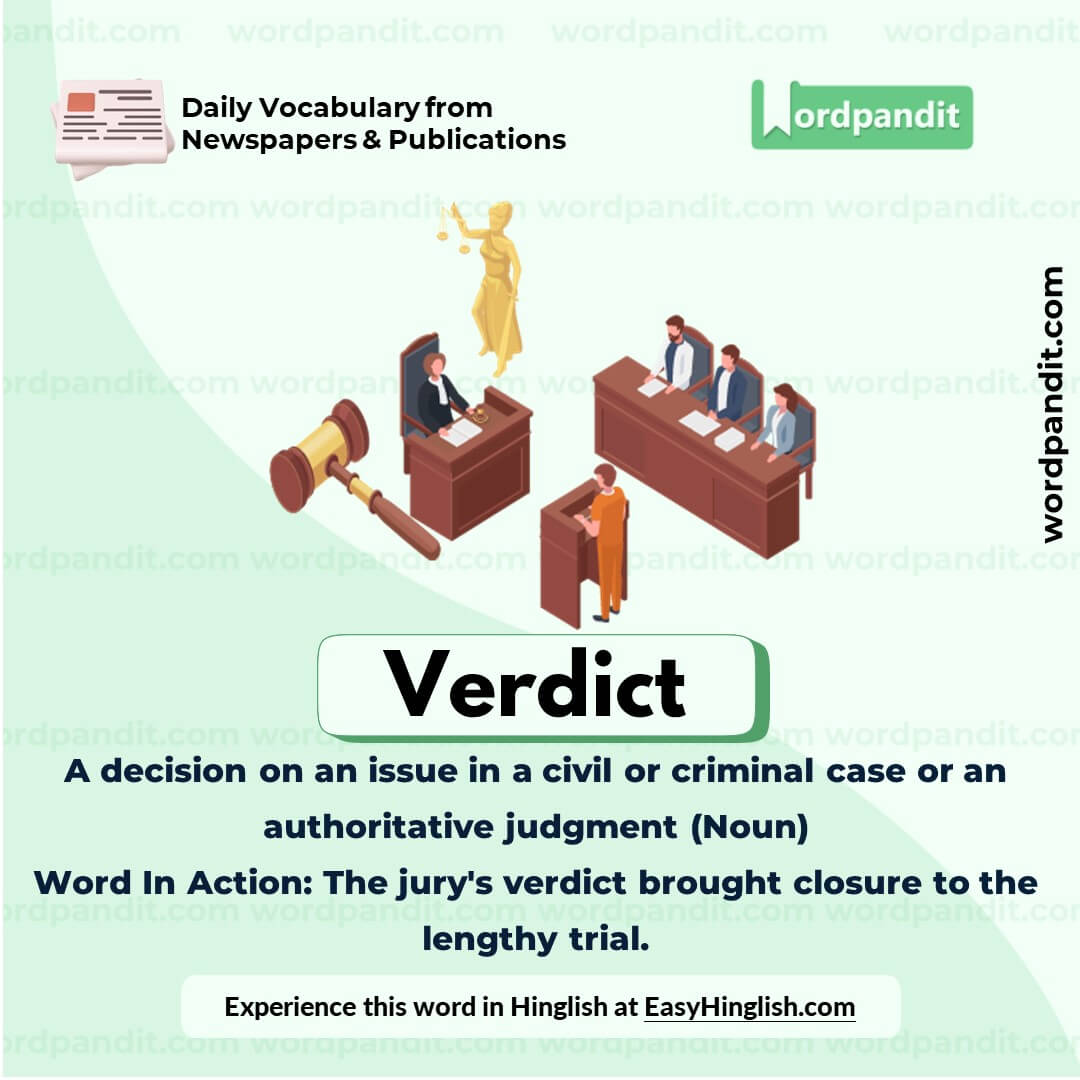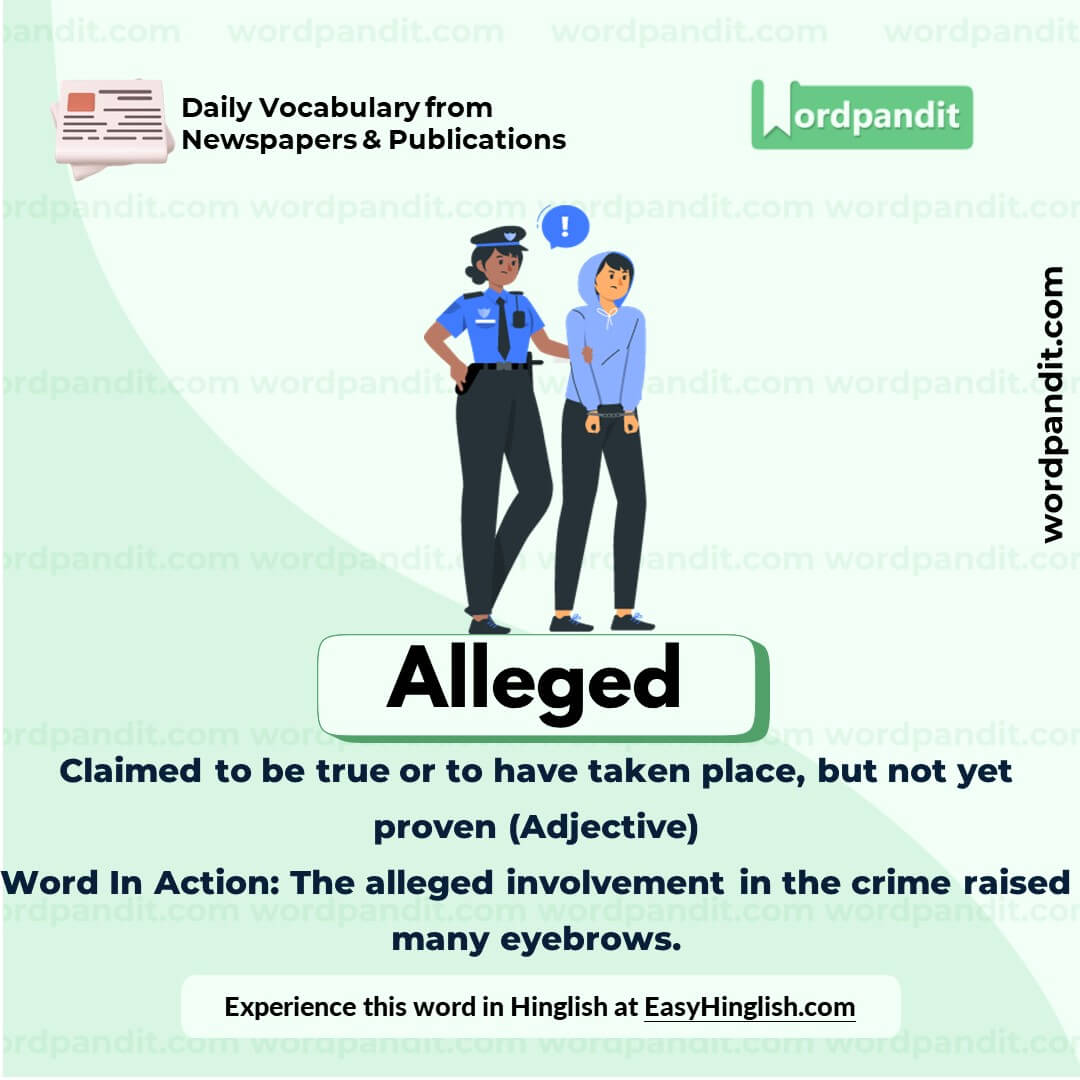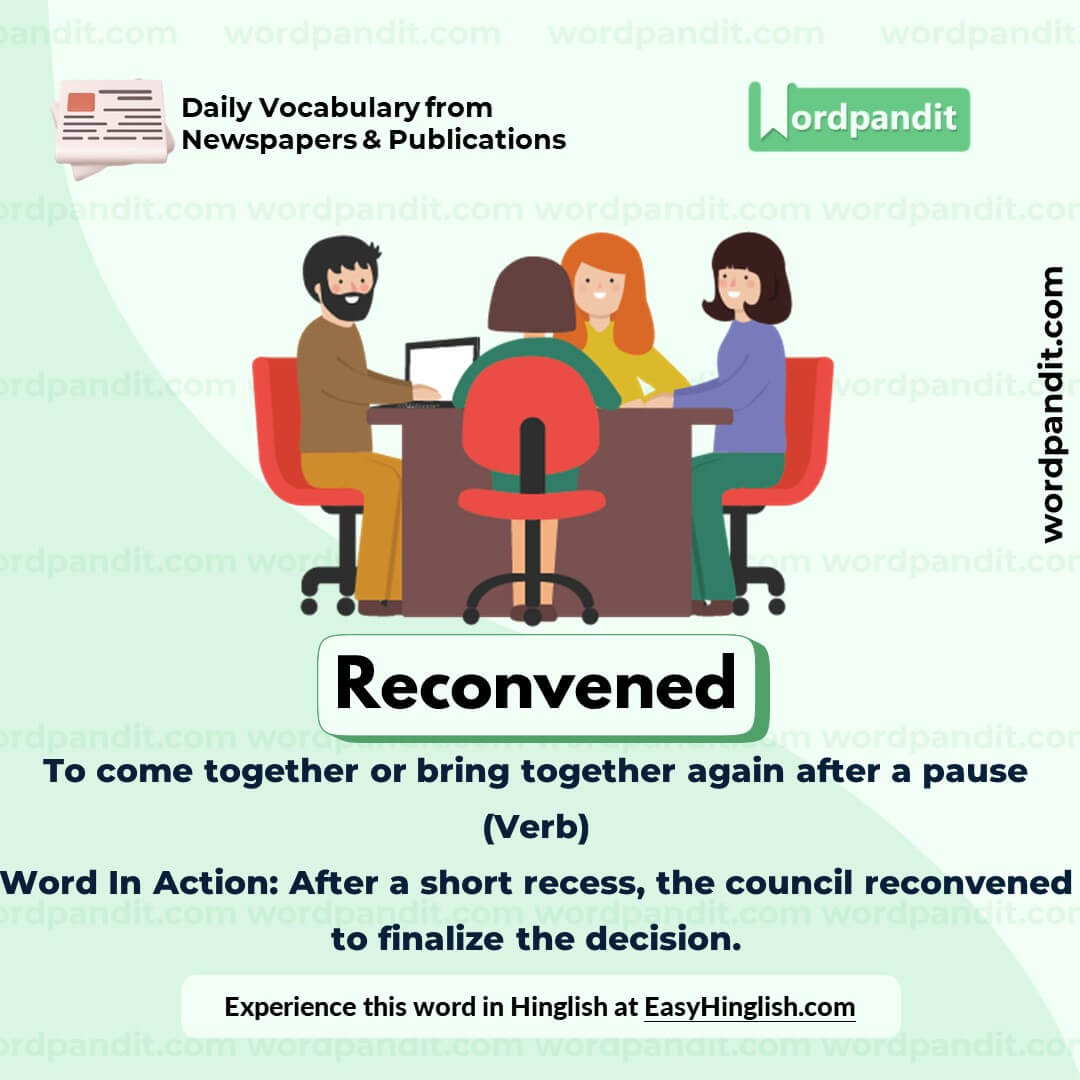Daily Vocabulary from Indian Newspapers and Publications
Welcome to Wordpandit’s Indian Vocabulary Hub
At Wordpandit, we understand the importance of staying rooted in the local context while expanding your language skills. This section focuses on enriching your vocabulary with words and phrases drawn from India’s leading newspapers and publications, ensuring you're learning vocabulary that is practical, relevant, and uniquely Indian.
Why Indian Sources Matter
We believe that the best way to master any language is by immersing yourself in local content. That’s why we carefully curate vocabulary from top Indian publications, including:
- The Hindu
- The Times of India
- The Economic Times
- Hindustan Times
- Live Mint
- The Indian Express
- And many others...
Stay Updated, Stay Relevant
With daily updates from Indian news sources, you’ll be consistently learning words that reflect the trends and shifts in Indian society and culture. Our focus is to provide vocabulary that enhances your understanding of the language in an Indian context.
How Wordpandit Supports Your Goals
Whether you’re preparing for exams, aiming to improve your professional communication, or simply want to stay connected with the latest Indian vocabulary, Wordpandit is here to guide you every step of the way.
Learn with a Practical Approach
Our interactive learning methodology includes real-world examples, engaging activities, and context-specific usage to ensure that every word becomes part of your active vocabulary.
Dive into Indian Vocabulary Today!
Why Choose Wordpandit?
Practical Learning: Focus on words you'll actually encounter in real-world reading, enhancing your comprehension and communication skills.
Diverse Content: From current affairs to scientific breakthroughs, our varied sources expose you to vocabulary across multiple domains.
Effortless Integration: Make Wordpandit a part of your daily routine. Just a few minutes each day can significantly boost your lexicon over time.
Your Path to Vocabulary Mastery
- Visit our Daily Vocabulary section regularly
- Explore new words and their usage in context
- Practice incorporating these words into your own writing and speech
- Track your progress as your vocabulary expands
Start Your Journey Today
Embark on your vocabulary enhancement journey with Wordpandit. By consistently engaging with our daily posts, you'll build a robust vocabulary that serves you well in academic, professional, and personal contexts.
Remember, a word a day keeps linguistic limitations at bay. Make Wordpandit your daily companion in the quest for vocabulary excellence!
WORD-1: Retrospective
Context:
"The fact that the Constitution was adopted in 1949 does not make any difference... the retrospectivity arguments if accepted will apply to all amendments," notes CJI - Telegraph India
Explanatory Paragraph:
The word "retrospective" relates to looking back on or dealing with past events or situations. In legal or formal contexts, it often refers to applying a rule or decision to situations that occurred before the rule or decision was enacted. This means considering or affecting past actions or events.
Meaning: Relating to or considering past events (Adjective)
Pronunciation: reh-troh-spek-tiv
Difficulty Level: ⭐⭐⭐ Intermediate
Etymology: Derived from Latin "retrospicere," meaning "to look back," from "retro" (backwards) + "specere" (to look).
Synonyms & Antonyms:
Synonyms: Retroactive, backward-looking, reflective
Antonyms: Prospective, forward-looking, anticipatory
Usage Examples:
- The court ruling was retrospective, affecting decisions made five years earlier.
- Her retrospective evaluation of the project's success highlighted areas for improvement.
- The artist's retrospective exhibition displayed works from her entire career.
- Changes to the tax laws were made retrospective to the beginning of the financial year.
Cultural Reference:
"Retrospective exhibitions are common in the art world, allowing viewers to appreciate an artist's evolution over time." - Art Critics Association
Think About It:
How can retrospective application of laws or policies ensure fairness, and when might it cause unintended harm?
Quick Activity:
Write a short paragraph using "retrospective" to describe a personal reflection on a past event or experience.
Memory Tip:
Think of "retro" as something old or past, and "spect" as in spectacles (to see). Together, "retrospective" means looking back or seeing into the past.
Real-World Application:
Retrospective amendments are frequently used in tax and corporate laws to address gaps in previous legislation, but they can sometimes lead to disputes if stakeholders are affected unexpectedly.
WORD-2: Prominent
Context:
"As soon as the House reconvened at noon, Opposition members were heard raising slogans about the violence in Uttar Pradesh's Sambhal and demanding a probe into the allegations levelled against a prominent businessman in a US court." - Telegraph India
Explanatory Paragraph:
The word "prominent" is used to describe someone or something that is important, well-known, or easily noticeable. It can refer to people who have a significant reputation or achievements, or objects and features that are conspicuous and stand out.
Meaning: Important, famous, or easily noticed (Adjective)
Pronunciation: proh-muh-nuhnt
Difficulty Level: ⭐⭐ Beginner
Etymology: Derived from Latin "prominentem," meaning "jutting out, projecting," from "pro-" (forward) + "minere" (to project).
Synonyms & Antonyms:
Synonyms: Notable, distinguished, eminent, conspicuous
Antonyms: Insignificant, obscure, inconspicuous, unremarkable
Usage Examples:
- The prominent scientist received a prestigious award for her groundbreaking research.
- A prominent hill can be seen on the horizon from miles away.
- The issue of climate change has become increasingly prominent in global discussions.
- He is a prominent figure in the world of classical music.
Cultural Reference:
"Prominent figures in history, such as Martin Luther King Jr., have shaped the course of societies worldwide." - History Today
Think About It:
What qualities make someone or something prominent in a particular field or context?
Quick Activity:
List three prominent leaders in history and briefly describe their contributions.
Memory Tip:
Think of "prominent" as being "pro" (forward) + "minent" (standing out), like something or someone that stands out from the rest.
Real-World Application:
The term "prominent" is widely used in media to highlight individuals or issues of significant importance, often shaping public opinion or priorities in society.
WORD-3: Verdict
Context:
"Justice Sanjay Kumar had on November 22 reserved its verdict on a batch of pleas filed by former Rajya Sabha MP Subramanian Swamy, advocate Vishnu Shankar Jain and others, challenging the inclusion of the words 'socialist' and 'secular' in the Preamble to the Constitution." - Telegraph India
Explanatory Paragraph:
The word "verdict" refers to a formal decision or judgment, typically made by a jury in a court of law. It can also broadly apply to any authoritative decision or opinion on an issue. The term underscores the finality and importance of the decision being rendered.
Meaning: A decision on an issue in a civil or criminal case or an authoritative judgment (Noun)
Pronunciation: vur-dikt
Difficulty Level: ⭐⭐ Beginner
Etymology: Derived from Latin "veredictum," meaning "a true saying," from "verus" (true) + "dicere" (to say).
Synonyms & Antonyms:
Synonyms: Judgment, ruling, decision, conclusion
Antonyms: Indecision, hesitation, uncertainty
Usage Examples:
- The jury reached a unanimous verdict of not guilty.
- After months of debate, the council delivered its verdict on the proposed development plan.
- The court’s verdict in the landmark case set a new legal precedent.
- The public’s verdict on the new policy was overwhelmingly negative.
Cultural Reference:
"In Harper Lee's 'To Kill a Mockingbird,' the jury’s controversial verdict underscores themes of racial injustice and prejudice." - Literature Classics
Think About It:
How does the concept of a "verdict" shape our understanding of justice and accountability in society?
Quick Activity:
Write a short story where the verdict of a trial plays a pivotal role in the plot development.
Memory Tip:
Think of "verdict" as "ver" (true) + "dict" (to speak), meaning a true statement or decision.
Real-World Application:
The word "verdict" is commonly used in legal discussions, news reports, and even informal settings to describe final decisions, highlighting its significance in resolving conflicts or disputes.
WORD-4: Alleged
Context:
"West Bengal government over a number of issues, including the appointment of vice-chancellors of state universities, and alleged snooping of Kolkata Police personnel in his office." - Telegraph India
Explanatory Paragraph:
The word "alleged" is used to describe something that is claimed to have happened or be true but has not been proven. It often precedes accusations, suspicions, or claims, especially in legal, political, or journalistic contexts, to indicate that the information is not confirmed or verified.
Meaning: Claimed to be true or to have taken place, but not yet proven (Adjective)
Pronunciation: uh-lejd
Difficulty Level: ⭐⭐ Beginner
Etymology: From Old French "alegier" (justify or excuse), based on Latin "allegare," meaning "to adduce in support of something."
Synonyms & Antonyms:
Synonyms: Supposed, claimed, purported, asserted
Antonyms: Confirmed, verified, proven, established
Usage Examples:
- The alleged theft is under investigation by local authorities.
- The article detailed the alleged corruption in the company’s management.
- Witnesses reported the alleged involvement of several key suspects.
- The politician denied the alleged misuse of public funds.
Cultural Reference:
"In journalism, the word 'alleged' is commonly used to describe accusations or claims that have not been substantiated, ensuring impartial reporting." - Media Ethics Journal
Think About It:
Why is it important to use words like "alleged" when discussing unverified claims or accusations?
Quick Activity:
Write a sentence using the word "alleged" to describe an unverified situation you read about recently in the news.
Memory Tip:
Think of "alleged" as "a legend" — a story told but not confirmed to be true.
Real-World Application:
The term "alleged" is essential in legal and journalistic fields to ensure neutrality and avoid defamation when referring to accusations or claims awaiting confirmation.
WORD-5: Reconvened
Context:
"As soon as the House reconvened at noon, Opposition members were heard raising slogans about the violence in Uttar Pradesh's Sambhal and demanding a probe into the allegations levelled against a prominent businessman in a US court." - Telegraph India
Explanatory Paragraph:
The word "reconvened" refers to bringing a meeting, assembly, or group back together after a pause or break. It signifies the resumption of a previously interrupted session or gathering. This term is often used in formal settings like courts, legislatures, or committees.
Meaning: To come together or bring together again after a pause (Verb)
Pronunciation: ree-kun-veen-d
Difficulty Level: ⭐⭐ Beginner
Etymology: From Latin "re-" (again) + "convenire" (to come together), meaning "to assemble again."
Synonyms & Antonyms:
Synonyms: Reassembled, resumed, rejoined, continued
Antonyms: Disbanded, adjourned, dispersed, ended
Usage Examples:
- The council reconvened after lunch to continue discussions on the budget.
- The jury reconvened to deliberate further on the case.
- Parliament reconvened following a two-week recess.
- The committee reconvened to finalize the details of the project proposal.
Cultural Reference:
"In diplomatic history, peace talks often reconvene after breaks to allow parties to reassess and strategize before continuing negotiations." - International Relations Review
Think About It:
What factors determine how successfully a group can reconvene and resume discussions after a long break?
Quick Activity:
Write a short paragraph describing an event or meeting that reconvened after an unexpected interruption.
Memory Tip:
Think of "re-" meaning "again" and "convened" as "brought together," so "reconvened" means brought together again.
Real-World Application:
The concept of reconvening is crucial in decision-making processes, ensuring that important matters are resumed and resolved efficiently after breaks or interruptions.
















